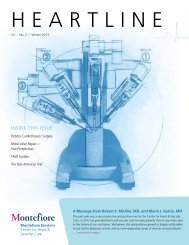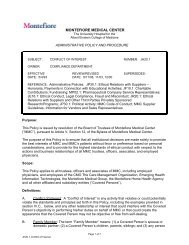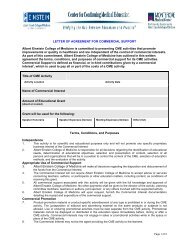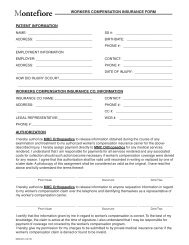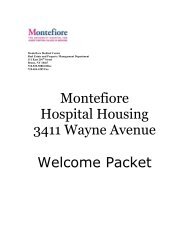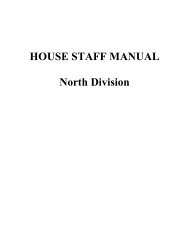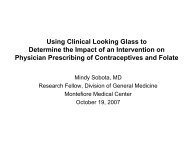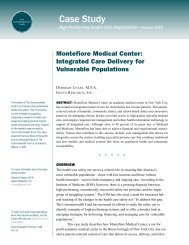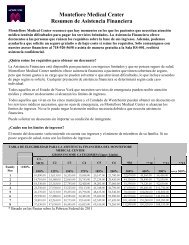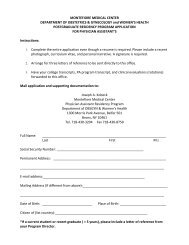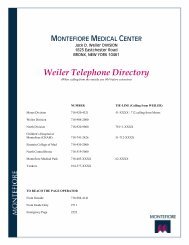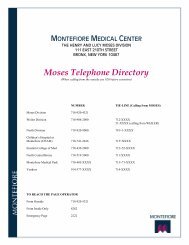Medical Staff House Staff Orientation Manual - Montefiore Medical ...
Medical Staff House Staff Orientation Manual - Montefiore Medical ...
Medical Staff House Staff Orientation Manual - Montefiore Medical ...
You also want an ePaper? Increase the reach of your titles
YUMPU automatically turns print PDFs into web optimized ePapers that Google loves.
• family has moral or religious objections to brain death definition or determination.<br />
• clinical staff has conscientious objection to brain death definition or determination.<br />
CONTACT:<br />
Neurology 718- 920-6444<br />
Neurosurgery 718- 920-4196<br />
<strong>Medical</strong> Director 718- 920-7052; 6078<br />
DO-NOT-RESUSCITATE (DNR) ORDERS<br />
Summary - Administrative Policy and Procedure # JA11.1<br />
Note: This summary contains the key points of this policy. For a complete understanding of all<br />
the relevant provisions, it is necessary to thoroughly read the full policy.<br />
WHAT:<br />
A do-not-resuscitate (DNR) order is a consent to forego all or part of cardiopulmonary<br />
resuscitation in the event of a cardiac and/or respiratory arrest. A DNR order does not affect or<br />
limit any other care and can be consistent with aggressive treatment. In a cardiac and/or<br />
pulmonary arrest, a DNR order permits withholding both intubation and other components of<br />
CPR.<br />
NOTE: Do-not-intubate (DNI) orders are distinct from DNR orders. In a cardio-pulmonary<br />
arrest, a separate DNI order is not needed. Refer to Policy JDO5.1 for complete information on<br />
DNI orders.<br />
WHO:<br />
• Suitable patients for DNR orders are those who are unlikely to survive or benefit from<br />
resuscitation in the event of a cardiopulmonary arrest.<br />
• Suitable patients with capacity should be approached for consent to a DNR order.<br />
• Suitable patients without capacity should have consent to a DNR order given either by an<br />
appointed health care agent or a DNR surrogate (see list of authorized surrogates) based on<br />
one of the four specified medical conditions (see below).<br />
• The patient’s attending physician determines suitability and decisional capacity, obtains<br />
consent and writes the DNR order and notifies the patient or surrogate that the order has been<br />
written.<br />
• A determination by the attending that the patient lacks capacity must be confirmed by a<br />
second attending. The second attending also concurs that an incapacitated patient without a<br />
health care agent meets one of the four specified medical conditions (see below).<br />
• <strong>House</strong> staff may obtain consent and enter a temporary DNR order after discussion with the<br />
attending, who should countersign the order or enter a standing order on CIS within 24 hours.<br />
• <strong>Medical</strong> director or designee must review, document and sign a DNR order based on medical<br />
futility for patients who meet one of the two specified criteria, have no advance directives or<br />
known wishes, no willing/available surrogate, and no family objecting to a DNR order.<br />
95



